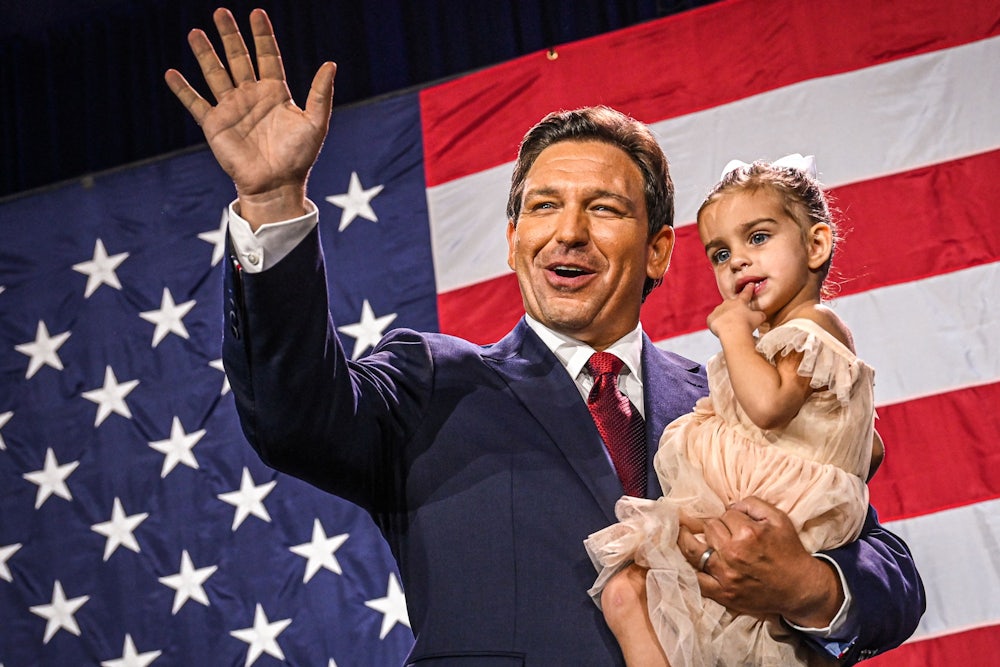A Florida Republican did the unthinkable on Tuesday: He won Miami-Dade County. Once a bastion of Democratic support and home to 1.5 million voting-age Latinos, the locale is rightly seen as a Sunshine State bellwether. Once purple, Florida is now solidly red.
This politician’s closing message clearly resonated. “They saw what socialism and communism and Marxism can do and they are not going to lose this country,” he said of Miami-Dade’s hundreds of thousands of Cuban Americans. It’s the kind of breakthrough upon which presidential bids are fashioned, causing pundits and activists alike to swoon over a politician capable of building the kind of multiracial coalition Republicans have jabbered about for years.
The Florida Republican is, of course, the state’s senior senator, Marco Rubio.
No one is actually taking Rubio seriously as a 2024 contender: Those dreams dried up during the 2016 contest, when Donald Trump routinely humiliated him, referring to him as “Liddle Marco” and saying, after one debate, that he was so nervous he “looked like he had just jumped into a swimming pool with his clothes on.” Rubio, who implied during those primaries that Trump had a small penis, ended up responding to Trump’s alpha male abuse with fawning praise and unswerving loyalty. There was Trump on stage with the senator when he delivered the aforementioned remarks about Cuban Americans.
Instead of Rubio, the Florida Republican who has garnered post-midterm attention is the state’s governor, Ron DeSantis, who won a landslide reelection victory on Tuesday.
DeSantis, to be fair, also carried Miami-Dade and received more votes than Rubio—4,609,112 to the senator’s 4,469,885. His accomplishment was in another way more impressive: A Republican gubernatorial candidate hasn’t won Miami-Dade in 20 years, whereas Rubio won it, thanks to a convoluted three-person race, in 2010 during his first campaign for statewide office. But Rubio faced a tougher challenger in seasoned Democrat Val Demings, whereas DeSantis faced washed-up former Republican Charlie Crist.
DeSantis is now enjoying the kind of moment pols dream about. The mainstream and conservative media have anointed him not just a rising star on the right, but perhaps the leading contender for the Republican Party’s 2024 presidential nomination. Betting markets are rating him that way. And, on the right, there has been a coordinated effort to boost DeSantis’s profile—and to paint Donald Trump, correctly, as the biggest reason why Republicans fell short of expectations in the midterm elections.
But there are plenty of reasons to believe that DeSantis is being overhyped. He’s undoubtedly a rising GOP star, but he barely surpassed Rubio—there’s no reason to believe that he has eclipsed Trump or to suggest that he commands anywhere near the same number of die-hard supporters.
The fact that Rubio and DeSantis received more or less the same number of votes hardly suggests that the governor is a generational political talent. A simpler explanation is that DeSantis and Rubio both benefited from an incredibly successful multiyear voter registration and outreach campaign by Republicans and the simultaneous collapse of the state’s Democratic Party. Florida has a lot more Republicans than Democrats now. It’s a red state. It elects Republicans like Ron DeSantis and Marco Rubio to office.
It’s possible that the effort to paint DeSantis as the hero of the midterms and Trump as the villain will succeed—it certainly won’t fail for lack of trying. The Murdoch empire has come out strongly against Trump and for DeSantis. Fox News labeled Trump the “biggest loser” of the midterms; the New York Post mocked “Trumpty Dumpty” (who naturally had a big fall) on one cover and labeled DeSantis “DeFuture” on another. The Wall Street Journal editorial board, which boosted and defended Trump throughout his presidency, cut him loose, also labeling him the party’s “biggest loser” in an unintentionally hilarious op-ed.
Since his unlikely victory in 2016 against the widely disliked Hillary Clinton, Mr. Trump has a perfect record of electoral defeat. The GOP was pounded in the 2018 midterms owing to his low approval rating. Mr. Trump himself lost in 2020. He then sabotaged Georgia’s 2021 runoffs by blaming party leaders for not somehow overturning his defeat. That gave Democrats control of the Senate, letting President Biden pump up inflation with a $1.9 trillion Covid bill, appoint a liberal Supreme Court Justice, and pass a $700 billion climate spending hash.
If Trump was such a loser, then why did The Wall Street Journal editorial board back him over and over and over again? But the editorial board is not, in this case, wrong. There is considerable evidence to suggest that Trump is a drag on GOP hopes, even if he does bring out nontraditional and erratic voters when he is on the ballot. There is also, however, a considerable amount of evidence that voters vastly prefer the real thing—Trump—to knockoffs and retreads: In elections where Trump is not on the ballot (think Georgia’s 2021 Senate runoffs) Republicans run behind him. As this year’s midterms demonstrated, even Trump handpicking candidates doesn’t instill those candidates with Trump’s essence, nor does it guarantee his voters will turn out in droves.
DeSantis has positioned himself as Trump Lite; he literally stands and talks like the former president and has tried to adopt the mantle of grievance-fueled culture-warrior-in-chief, Trumpism without the loose cannon qualities. That may appeal to Murdochland and GOP establishmentarians (such as they are these days), but do actual Republican voters want Trump Lite when they can have the larger-than-life original? There’s no reason to believe they do. Remember: This isn’t the first time Trump has been given last rites politically. He sent a mob to attack the U.S. Capitol, where his own vice president was, and still got to play kingmaker this cycle.
DeSantis will face the same conundrum that every Republican faced in 2016 when they sparred with then-candidate Trump: If you attack him for being a loser do you risk losing his voters? If you attack him for being washed-up will he spend every waking hour—and there are many waking hours in Donald Trump’s life—trying to destroy you?
Similarly, the conservative elites backing DeSantis to the hilt may also spell trouble. In 2016, Donald Trump successfully ran against both the Republican and Democratic establishments. The Murdoch media empire attacked him then, at least for a bit—and he won; Murdochland responded by turning Fox News into the Trump administration’s house organ. Attacks from Republican scions only bolstered his image as an outsider and iconoclast in 2016. Those same conservative elites are now embracing DeSantis. Trump wisely will use that against him.
A senior Trump adviser just confirmed Tues announcement & said “The media, the corporate elites, and political establishment has all moved in unison against Donald Trump at their own peril. It’s like they want to recreate 2015-2016. Let them. We are doing it again. Buckle up”
— Marc Caputo (@MarcACaputo) November 10, 2022
This isn’t 2016. Trump can’t portray himself as an outsider as he did then. He lost his touch as a coiner of insults long ago—“Ron DeSanctimonious,” his attempt at roasting the Florida governor, is his worst yet. But Republicans lining up behind DeSantis are making many of the same mistakes they did then. And they’re doing it behind a candidate whose major accomplishment was a landslide in a solidly Republican state.
As the character Verbal Kint opined in The Usual Suspects, shooting the devil in the back is risky. “What if you miss?”










